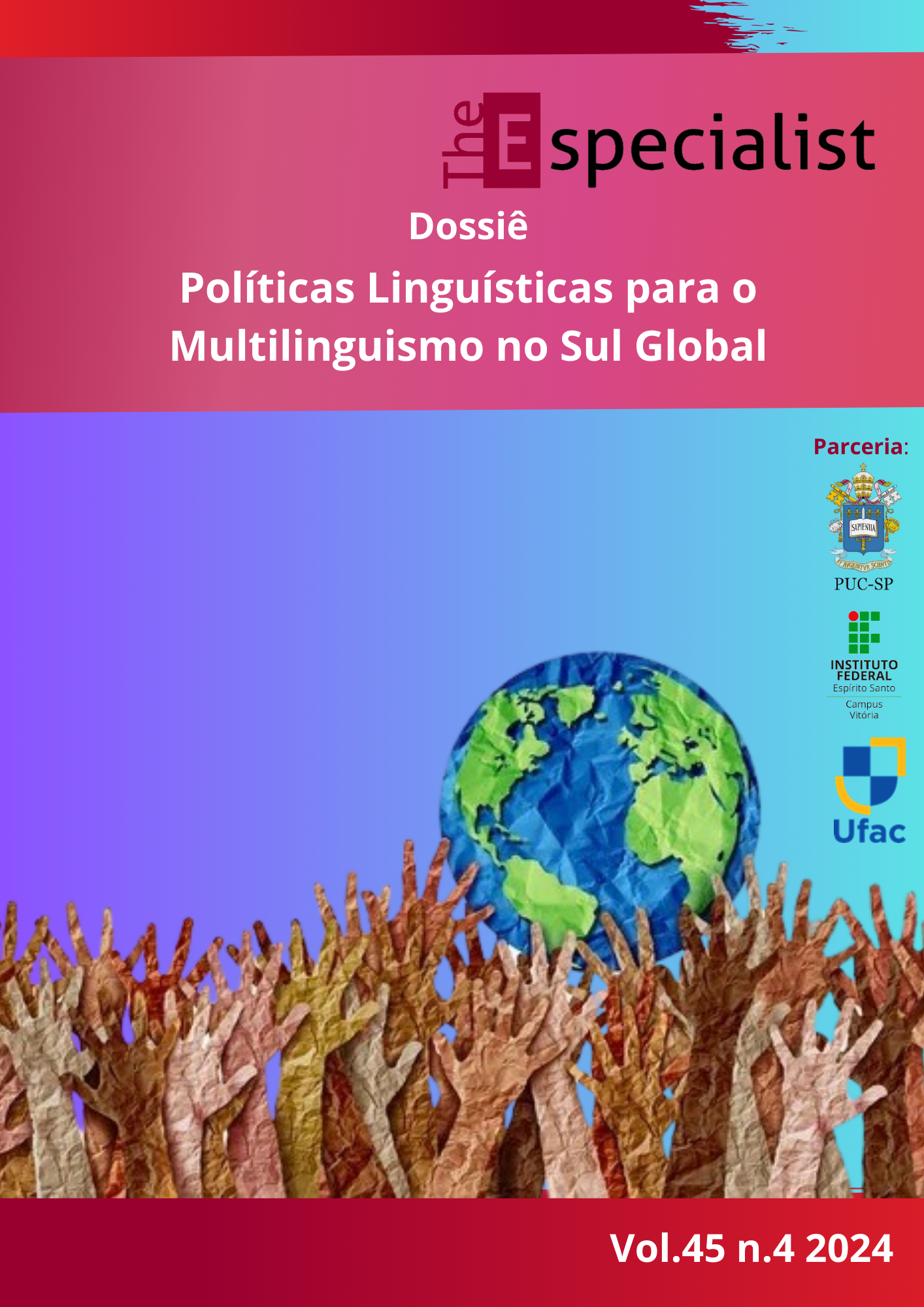Inverted stereotypes in the reflective-collaborative training of Portuguese foreign language teachers exam
DOI:
https://doi.org/10.23925/2318-7115.2024v45i4e63404Keywords:
stereotypes, teaching training, reflexive-collaborative work, decolonialityAbstract
This article presents the results of a training course for teachers of Portuguese as a Foreign Language in which there is no gap between the dichotomies of theory/practice and teacher/researcher (Wallace, 2001). This training values reflexive-collaborative work (Schon, 2000; Dutra; Mello, 2004) and its main objective was to analyze how this work related to intercultural education helps the teacher to develop a critical view of himself/herself as a Brazilian teacher and of the foreign students. As a methodology, we used the recording of classes and the notes that were taken for discussions in the collaborative sessions. One of the topics that emerged from the analyzes of the practice of the teachers were the stereotypes presented not only by the students, but mainly by the teachers themselves (Schneider, 2005; Borghetti, 2013 e McFarlane, 2014). As a result, we can point to the fact that our discussions led the teachers, at first, to become aware of their preconceived ideas and of the posture they assumed in class motivated by these prejudices (Maldonado-Torres, 2007; Quintero, 2019), thus leading them to rethink their beliefs and values and modify their actions.
References
ADORNO, T.; HORKHEIMER, M. 1985. Dialética do esclarecimento. Rio de Janeiro: Jorge Zahar Ed., 1985.
BORGHETTI, C. 2008. Un modello metodologico per l’insegnamento interculturale della lingua straniera (2011a). How to teach it? Proposal for a methodological model of intercultural competence. In: WITTE A.; HARDEN T. (Eds.), Intercultural Competence: Concepts, Challenges, Evaluations (pp. 141-160).
BORGHETTI, C. 2013. Unmasking Stereotypes in Travel Guides. A Teaching Activity for Cultural Foreign Language Education. Jan, 2013. Online.
DUTRA, A. F. 2019. O desenvolvimento da competência intercultural de alunos de Letras por meio do contato com assistentes de ensino americanas. Revista do GELNE, v. 21, p. 222-235.
DUTRA, A. F. 2014. A formação inicial do professor de português língua estrangeira: aprendendo a ser um profissional. Revista Signótica, v. 26, p. 579-602.
DUTRA, A. F. 2010. O processo reflexivo-colaborativo na formação inicial de professores de português língua estrangeira. Tese (Doutorado em Linguística Aplicada). Programa de Pós-Graduação Em estudos Linguísticos da Universidade Federal de Minas Gerais.
DUTRA, D. P.; MELLO, H. 2004. A prática reflexiva na formação inicial e continuada de professores de língua inglesa. In: Práticas de ensino de língua estrangeira: experiências e reflexões. Campinas: Pontes, pp 31-43.
FREIRE, P. 1987. Pedagogia do oprimido, 17ª ed. Rio de Janeiro, Paz e Terra.
LANDER, E. (org.) 2000. La colonialidad del saber: eurocentrismo y ciencias sociales. In: Perspectivas latinoamericanas. Buenos Aires: CLACSO.
LEFFA, V. J. 2005. O professor de línguas estrangeiras: do corpo mole ao corpo dócil. In: FREIRE, M.; ABRAHÃO, M. H. V.; BARCELOS, A. M. F. (Org.) (2005). Linguística Aplicada e contemporaneidade. São Paulo: ALAB/Pontes, p. 203-218.
MALDONADO-TORRES, N. 2007. “Sobre la colonialidad del ser: contribuciones al desarrollo de un concepto”. In: CASTRO-GÓMEZ, S.; GROSFOGUEL, R. (orgs.) (2007). El giro Decolonial. Reflexiones para una diversidad epistémica más allá del capitalismo global. Bogotá: Pontificia Universidad Javeriana– Siglo del Hombre, pp. 127-67.
McFARLANE, D. A. 2014. A Positive Theory of Stereotyping and Stereotypes: Is Stereotyping Useful? Journal of Studies in Social Sciences. ISSN 2201-4624 Volume 8, Number 1, 140-163.
OLIVEIRA, A. L. A. M. 2006. Hermes e bonecas russas: um estudo colaborativo para compreender a relação teoria-prática na formação docente. Tese (Doutorado em Linguística Aplicada). Programa de Pós-Graduação Em estudos Linguísticos da Universidade Federal de Minas Gerais.
QUINTERO, P.; FIGUEIRA, P.; e ELIZALDE, P. C. 2019. A Brief History of Decolonial Studies. Masp Afterall.
SANTOS, B. de S. 2007. Para além do pensamento abissal: das linhas globais a uma ecologia de saberes. Novos estudos. CEBRAP (79) • Available online at: https://doi.org/10.1590/S0101-33002007000300004. Last accessed: August 29th 2023.
SANTOS, H. S. 2002. O papel de estereótipos e preconceitos na aprendizagem de línguas estrangeiras. In: CONGRESO BRASILENO DE HISPANISTAS, 2., 2002, San Pablo. Associação Brasileira de Hispanistas. Disponível em:
http://www.proceedings.scielo.br/scielo.php?script=sci_arttext&pid=MSC0000000012002000100029&lng=en&nrm=abn . Acess on: 08 July. 2024.
SANTOS, I. G. 2010. Os estereótipos culturais no ensino do FLE. Teoria e Prática. Dissertação. (Mestrado em Estudos Linguísticos, Literários e Tradutológicos em Francês). 2010. Faculdade de Filosofia, Letras e Ciências Humanas da Universidade de São Paulo, 2010.
SCHON, D. A. (2000) Educando o profissional reflexivo: um novo design para o ensino e a aprendizagem. Tradução: Roberto Cataldo Costa; Porto Alegre: Artmed, 2000.
STRECK ,V. S.; ADAM, J. C.; CARVALHAES , C.. eds. 2021. (De)coloniality and religious practices: liberating hope. IAPT. CS 2: 4-13.
WALLACE, M. J. 2001. Training Foreign Language Teachers: A Reflexive approach. Cambridge: Cambridge University Press.
WALSH, C. 2019. Decolonial Praxix: Sowing existence-life in times of dehumanities. Keynote talk presented to the IX Congress of the Inter¬national Academy of Practical Theology, Sao Leopoldo, Brazil, April 5.
Downloads
Published
How to Cite
Issue
Section
License
Copyright (c) 2024 The ESPecialist

This work is licensed under a Creative Commons Attribution 4.0 International License.
The authors grant the journal all copyrights relating to the published works. The concepts issued in signed articles are the absolute and exclusive responsibility of their authors.


 Esta obra está licenciada com uma Licença
Esta obra está licenciada com uma Licença 